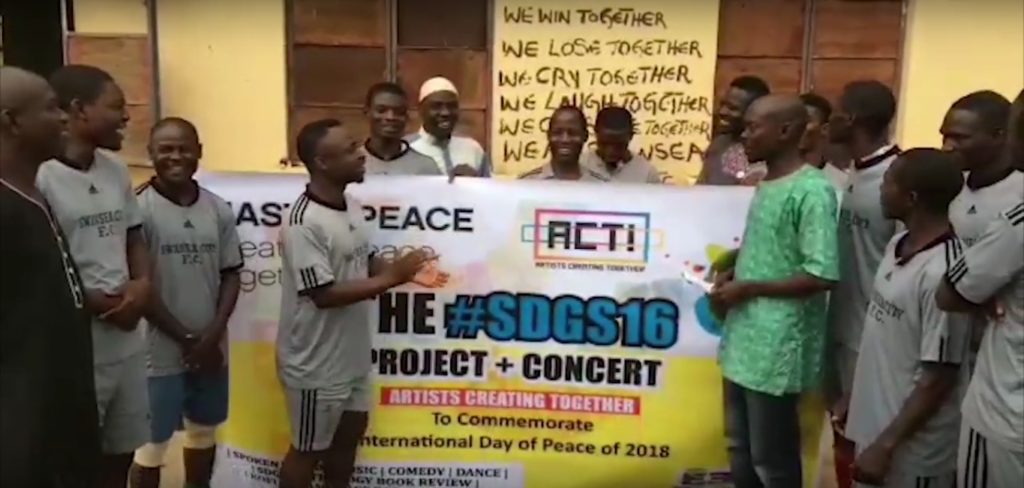Nigeria: Football for change

Football for Peace is a project that was carried out by our MasterPeace Club in Nigeria. This event was held on the International Day of Peace in 2018. The #PeaceDayMatch was held in Zaria Nigeria and was hosted by Swansea FC, a local team consisting of mainly Muslims and one Christian.
Project brief
Footballers are artists too, considering the level of skills the feet can display. It’s a great way to give expression to your feelings and just focus on one thing – playing! Next to that, there is a great community feeling as your aim is to play together – the team is your support system. The importance of the team dimension was very interesting during this project, as both Christians and Muslims as well as the lgbo and Hausa tribes were mixed in the teams, communities who ordinarily avoid crossing paths in the path towards the elections.
Project context
“In terms of conformity, tribalism may also refer in popular cultural terms to a way of thinking or behaving in which people are more loyal to their tribe than to their friends, their country, or any other social group. Tribalism has been defined in engaged theory as a ‘way of being’ based upon variable combinations of kinship-based organization, reciprocal exchange, oral communication, and analogical enquiry. It is defined as” -Collins G. Adeyanju “a label for social groups who feel a distinct sense of difference by virtue of common culture and descent” (Glazer and Moynihan; 1975).
This subject is crucial because, while tribal societies have been pushed to the edges of globalization, tribalism is arguably undiminished; because it is founded upon intense feelings of common identity that leads people to feel tribally connected. It is often more about” (Collins G. Adeyanju; 2014). “feeling” of commonality than actual commonality; and that is why it is as powerful as religion in Africa.
In Nigerian context, ethnicity or tribalism is defined as social phenomena associated with the identity of members of a competing communal group(s) seeking to protect and advance their interest in a political system. The relevant communal factor may be language, culture, race, religion and/or common history. What is peculiar to ethnicity or tribalism is that “it involves demands by one group on other competing group(s)” (Nnoli; 2008). Chinua Achebe in his view describes ethnicity “as discrimination against a citizen because of his/her place of birth” (Achebe; 1997).
In Nigeria, especially the Northern part of Nigeria, the Northerners, including Hausa don’t associate with the Igbos. The Igbos originally came from the Eastern part of Nigeria and migrated to the North, and some other parts of the country. They are considered to be a threat by other tribes for they can set up new businesses and thus be competition to the Northerns. The Hausa and Igbos don’t have the same nor similar ‘way of being’ this is also because of the difference in religion. The Northerners being predominantly Muslims and the Igbos being predominantly Christians. It is commonly known that there can be tension between these tribes.
MasterPeace Nigeria developed a concept to bring these groups together despite their differences. They organized a football tournament that was hosted by Swansea FC. This tournament was impactful in the sense that it brought these two tribes and religions together as one. The game ended 2-0 and all the players despite their different backgrounds recited the following words together: “WE WIN TOGETHER, WE LOSE TOGETHER, WE CRY TOGETHER, WE LAUGH TOGETHER, WE CELEBRATE TOGETHER. WE ARE SWANSEA CITY FC FOR LIFE. WORLD PEACE DAY!”
The MasterPeace Club in Nigeria was able to teach the 50 participants peacefully and stress the importance of living in a peaceful community. The goal of this project was to spread peace and understanding across the community and the importance of living together regardless of your tribe and religion.
Outcomes
- Teaching the 50 participants about the importance of living in a peaceful community.
- Spread awareness on the social matter through dialogue and sports.
- Bringing peace and solidarity amongst the youth in Nigeria.
Impact
- Contribute to the active participation of youngsters in tackling tribalism.
- Creating perspective and dialogue together with individuals of two tribes, through sports and teamwork.

